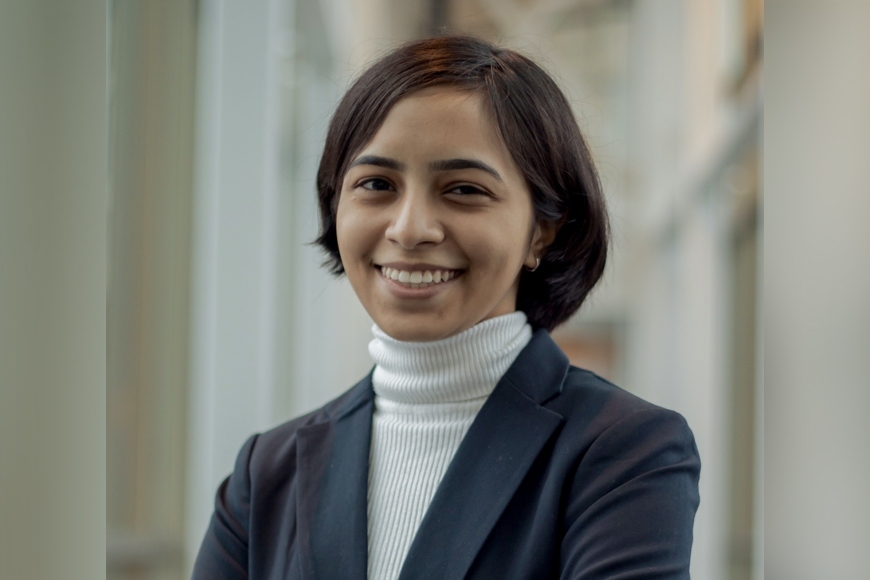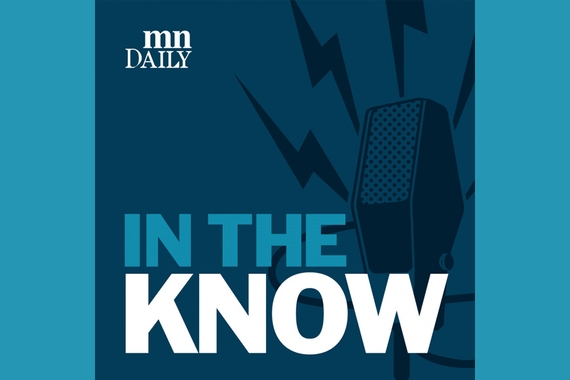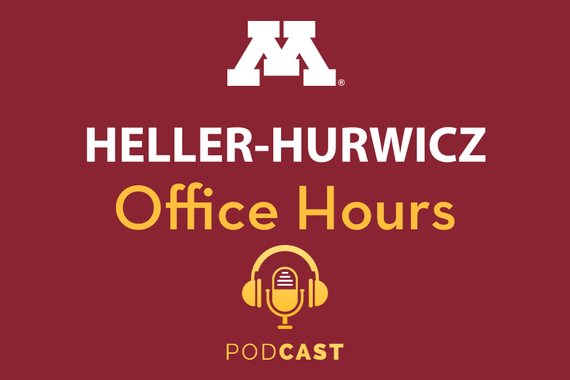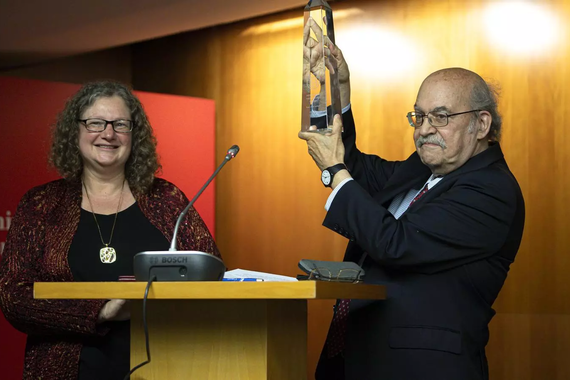“Like Two Friends Talking”
In October 2022, University of Minnesota sophomore Anushka Raychaudhuri was accepted to the Women in Economics (WIE) Program. Raychaudhuri, an economics and finance double major, was excited, but also slightly nervous and unsure what to expect. Seven months later, the program had been immensely helpful, providing a wealth of valuable academic and career advice, developing skills, and forging a strong community filled with new friendships.
The Production of a Program
Raychaudhuri took part in the third edition of the growing WIE Program. In 2018, Annie Bigley, Economics’ senior academic advisor, began developing the program, which was inspired by her time at the Women's Leadership Institute at the University of San Diego.
The field of economics, she says, is “grappling with women being underrepresented.” Tiffany Murphy, a fellow senior academic advisor, adds that the program “was one of our ways of trying to build and create an inclusive environment within economics for women and nonbinary students, to help them to have a sense of belonging, to connect them with alumni so that they can see somebody [who shares an identity of theirs] in those positions.” By 2020, the program was nearly ready to begin. “Then the world shut down,” Bigley says, and the program was put on hold due to the COVID-19 pandemic.
But rather than shut the program down for good, the pandemic provided more motivation to start it. “We were grappling with how to engage our students,” Bigley says. “So we thought we'd pilot something to help support our especially underrepresented economics students, programs to help offer some consistency, programming, support, and community in a really tough time.” With the aid of the Heller-Hurwicz Economics Institute and its then-associate director, Eva Widder, a virtual pilot program was launched. “It was really successful,” Bigley recalls. “We got really great feedback from both the students and the mentors in that first year.” The program has continued growing ever since, featuring between fifteen and twenty students.
Applications open at the start of the academic year, with accepted applicants notified in October. The program is open to all economics majors, regardless of gender identity, and applications are competitive. Because mentorship is so important to this program, students are only accepted if a good mentor match can be found. Program members commit to attending five workshops throughout the year. These sessions are held in a hybrid format to accommodate students and mentors who are studying or working out of state. The first session covers introductions and sets community standards, with later sessions providing information about leadership, career planning, graduate school, and more.
A Formal Friendship
After applying and expressing an interest in learning more about industry opportunities, Raychaudhuri was paired with alum Alyssa Peterson (BS, ‘21), who was working in consulting. “I had never been part of a formal mentorship before, that was a brand new concept to me,” Raychaudhuri says. “I was kind of scared because I'm meeting this brand new person.” She found herself wondering, “How long I can sustain this conversation, what if I run out of questions, what are we going to talk about?”
Fortunately, “[Peterson] was great, she really put me at ease.” Their conversations flowed organically, and concerns over filling the monthly meetings quickly disappeared. Reflecting on the bond the two formed, Raychaudhuri admits, “I really didn't think that it would be so strong.” At first, she thought the mentorship “would be a contractual agreement, this month to this month and then it's over. But really, I think even now, I can lean on her for guidance and support. ” Raychaudhuri even spoke to Peterson before starting her summer internship, receiving advice from her mentor on adapting to this new experience. “It’s great to have someone who can relate to those experiences and makes you feel like you're not alone.”
The strength of the bond formed wasn’t the only surprise in these meetings. “Another unexpected thing is that it wasn’t just me ranting to her and then her giving me advice,” Raychaudhuri says. “She would also talk about her life experiences… so it was a conversation that didn’t have a hierarchy. It was like two friends talking.”
As they share their experiences within academia and industry, mentors provide important lessons. “I think the most important lesson for me was that it's okay to have your [main] interest change,” Raychaudhuri says. “When I came freshman year I thought I would go the academia route and do my PhD.” Now she plans to work in industry and feels comfortable accepting that there are many possible paths she may end up taking. She adds that the mentorship program helped her realize “that you always have avenues, you're not stuck, and you're definitely not alone. If I reached out to one of my peers, they were probably feeling the same.”
Mentors also help students plan for the future by giving concrete steps to help mentees explore their options. Peterson gave advice on résumés, cover letters, four-year academic plans, and economics elective courses. She also spoke about networking, suggesting that Raychaudhuri reach out to people she knew and have them reach out to one of their connections. “And that helps you because you have that mutual contact in between, it's not a cold call.” She has found informational interviews to be a very helpful way of evaluating occupations, as “you only get two or three internships during your time in college, so it’s not possible for you to explore every single role and position.”
Creating an Inclusive Community
The strengths of this program do not end with the formal mentorship, however; there are also the bonds formed between the scholars. Raychaudhuri spoke about the value of the group featuring many BIPOC and nonbinary people, all navigating a field mostly filled by white men. “There was an immediate sense of comfort and familiarity that came from us sharing similar identities and going through similar experiences. Our conversations were very honest… we had these really deep conversations, people were talking about sexism in the classroom, or maybe at other career events.” She explained that, importantly, “You were sharing it in a safe space. We were all tied together by our identities, in a sense.”
As the year goes on, the program continues to facilitate these important discussions. Program members have started reading and presenting about one book each year. Raychaudhuri and her peers read Data Feminism, which she says was eye-opening. “As economics and finance people, we deal with numbers a lot. [Checking] where the data comes from is very important because data is not always objective and neutral. Sometimes it suppresses a certain group of people.” The assignment sparked a series of thoughtful conversations. “We would read the book, see the injustices, and talk about ways we could improve in these areas.”
Members of the program formed bonds that extended outside of the workshops, from meeting new study buddies to building professional networks. They were also inspired to get involved in other economics department opportunities. Raychaudhuri is the president of the Economics Student Organization (ESO), and says that as a freshman, she was one of just a few women at most meetings. In the past year, more WIE program members have begun attending ESO meetings, which Raychaudhuri describes as a “great way to increase diversity in different spaces.”
As the Women in Economics Program continues to expand, its greatest strength continues to be its diversity, as it inspires and encourages diversity in the field of economics by bringing together a remarkable range of students and mentors. “The best thing about it is that you don't just get to meet people who have the same career interests as you,” Raychaudhuri explains—the cohort contains a wide range of interests and aspirations. “Women in Economics is all about breaking the homogeneity. And whenever you have such a heterogeneous, diverse group of people together, that's when all the best ideas come out. Your viewpoints on life and perspectives are so different that it generates diverse ideas, great ideas. And that's what Women In Economics is all about.”
Would you like to get involved?
Complete our interest form if you’d like to be a panelist or speaker or if you’d like to mentor a student. Contact Annie Bigley at bigleya@umn.edu if you have any questions.



